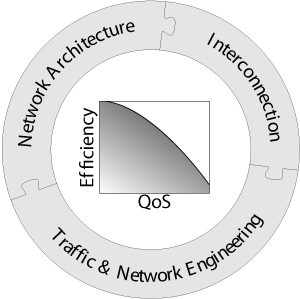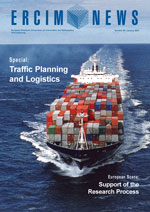by Oliver Heckmann
The Internet is a large network formed from 30,000 autonomous systems (AS), operated by thousands of Internet service providers (ISPs). While these ISPs compete with each other for customers and traffic, they must also cooperate and exchange traffic in order to maintain worldwide connectivity. In contrast to the traditional telecommunication markets, there are almost no central organisations in the Internet that enforce cooperation and regulate the market.
Given the competition among ISPs, it is vital that they operate their networks efficiently. Quality of service (QoS) is also important: many emerging multimedia applications such as voice and video communication can greatly benefit from QoS support in a network. This therefore opens further possibilities for value-added services with which providers can differentiate themselves and target new markets.
Hence, efficiency and QoS are crucial for ISPs operating the networks that comprise the Internet. Recent research, represented in the dissertation of Oliver Heckmann, gives new insights into how ISPs can improve in these areas. For his work, Oliver Heckmann was recently presented with the ERCIM Cor Baayen award. The central question of the dissertation is: how can an Internet service provider optimize the efficiency and quality of service of its network?
This work shows that efficiency and QoS strongly depend on three factors:
-
the network architecture (how the network is built)
-
traffic engineering and network engineering (how the network is adapted to changes)
-
the interconnections (how the network is connected with other networks).
A system-oriented approach is therefore employed, in which all these areas are analysed and optimized, while taking into consideration their mutual influences (see figure).

In the context of network architectures, the focus of the research lies on methods for providing QoS. Analytical models are developed in order to determine and analyse the overprovisioning factor of a plain best-effort network compared to networks that support explicit service differentiation. The work shows that the analytical overprovisioning factor ranges between three and five in most cases. Furthermore, the different IETF QoS architectures are evaluated and compared in an experimental study to confirm and extend previous findings.
In this context, a bandwidth broker for Differentiated Services networks is developed. It offers strong QoS guarantees and a high efficiency by overbooking. With the bandwidth broker, the so-called Charny bound can be broken and the utilization of networks with services of the highest QoS can be increased by a factor of about four.
The work shows that besides the network architecture, the interconnection structure also strongly influences the efficiency and QoS of an ISP. The interconnection structure describes how the network is connected with its peering and transit networks. Different approaches to optimizing the efficiency, reliability and QoS of the structure are described as decision problems, and are then solved and evaluated. The dissertation shows that with these approaches, cost savings of 5% to 30% can be realized, and QoS improved.
The effectiveness of using traffic engineering to further improve the efficiency and QoS obtained with the network architecture and interconnections is also analysed. Weaknesses in existing approaches are identified and corrected, taking the findings in the rest of the dissertation into account.
Due to the steadily increasing traffic volumes (Internet traffic is doubling in volume every 9-15 months), capacity expansion is the most important network engineering task of a provider. New strategies for capacity expansion are therefore elaborated and evaluated in this dissertation. They have significant advantages over the rules of thumb used today, since they also consider the influence of different network architectures and traffic engineering. The results show that traffic engineering should be explicitly taken into account when planning capacity expansions.
Links:
Online publication of the dissertation: http://elib.tu-darmstadt.de/diss/000522/
Homepage of the book 'The Competitive Internet Service Provider' by Oliver Heckmann (contains selected parts of the dissertation, introductory chapters plus updates): http://www.competitive-isp.info
Please contact:
Oliver Heckmann
E-mail: oliver.heckmann![]() gmail.com
gmail.com
Oliver Heckmann has been awarded the 2006 Cor Baayen Award for a most promising young researcher in computer science and applied mathematics by ERCIM. Oliver is currently working at rom Technical University Darmstadt, Germany, and Google Labs Zürich, Switzerland.










